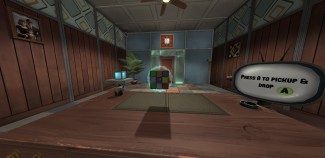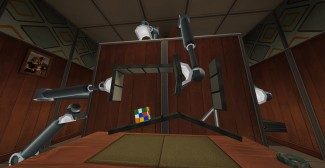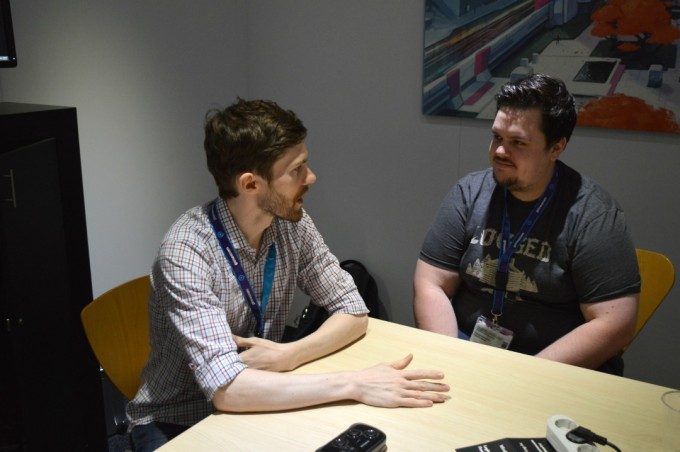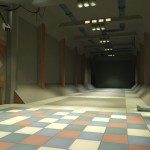Tom Beardsmore is CEO of Coatsink Software, the studio responsible for the Gear VR puzzle game Esper. With the not-too-distant release of the consumer version of the Oculus Rift on the rise, I wanted to know more about how Coatsink was handling the port to the new Rift, and what it had in store for the game studio.
I sat down with Beardsmore at Gamescom 2015 in Cologne to talk about the studio’s upcoming Oculus Rift release of Esper, a game that placed you in a re-imagined 1975 government facility—a sort of X-Men-style ‘School for the Gifted’—where you are pitted against a number of puzzles that test your new found telekinetic powers.
After sitting down to the Oculus version of the game, I noticed a few changes from the Gear VR version. What’s the first thing that pops into your mind?
 Well, the biggest thing is the change from the touchpad to the gamepad. It obviously makes a lot of sense that you’d use a touchpad for it, but that’s because the game was designed from the ground-up originally for Gear VR. We still think it works very well with the Xbox controller but also maybe it’s also a little bit easier for some people with the gamepad to use because the stick is easier to use instead of just swiping. That is the biggest change. It’s taken a lot of refinement to get right and comfortable and intuitive
Well, the biggest thing is the change from the touchpad to the gamepad. It obviously makes a lot of sense that you’d use a touchpad for it, but that’s because the game was designed from the ground-up originally for Gear VR. We still think it works very well with the Xbox controller but also maybe it’s also a little bit easier for some people with the gamepad to use because the stick is easier to use instead of just swiping. That is the biggest change. It’s taken a lot of refinement to get right and comfortable and intuitive
Gear VR version doesn’t have gamepad support yet, does it?
It’s going to.
What does positional tracking do for the new Rift version of the game?
Primarily we didn’t want to add things like being able to move around the room, or things like that in this game. It would change and break so much about the game, but we have added a few little treats for people that lets you look at puzzles from different angles. Especially with the pipe puzzles, you can try and figure out how to get around bends and stuff like that. There are also a few Easter eggs in there that you can find with the positional tracking, for example the table. Different parts of the game, like when the scene changes, there will be different things to look at.
Are there going to be new levels to the Oculus version of the game?
 The game as it is on Gear is pretty much what you’ll get on CV1—so about 2 hours of gameplay, but it won’t be our last VR project so we’ll be doing more for Rift in the coming months and years.
The game as it is on Gear is pretty much what you’ll get on CV1—so about 2 hours of gameplay, but it won’t be our last VR project so we’ll be doing more for Rift in the coming months and years.
Is there anything you’re exploring now that excites you about the future of VR?
I think that for the time being we would like to focus on experiences that are designed for the ground-up for VR and only work in VR. The thing that will play to the strengths and excite people more about the prospect of virtual reality, will bring new things that are not possible to reality. You could do a 3rd person game very well in VR and you could offer an interesting and unique perspective on the game, but it’s not a thing that only works in VR. I think this what this thing needs for now to justify it for people, to show them something new. I think that’s something we’ll keep trying to do—to show them something they can’t experience elsewhere.
So Esper is going to be available at launch for the Oculus Rift. It’s currently $4.99 on the Gear VR store. Does that price-point feel natural for the Oculus Rift?
I think it’s the whole value proposition thing, isn’t it? People expect a game on a phone to be cheaper than on a PC, but I think price increase is justified… by the time [the game launches we will] have put 5 months extra work into it to up-res everything. You know, do more with the audio on PC, do everything to make it as shiny as possible—you know, to be able to compete visually with other stuff that’s coming with the Rift launch. Hopefully people will see value to the up-res, that HD-ification kind of stuff.

Target audience is hard to talk about, because of the 13-year-old cut off line with Oculus (for whatever reason). Who is Esper for really?
It’s for people, like those at our studio, that are fans of Valve’s games: Portal, The Stanley Parable… puzzle games in general, but also narrative games. We try to make the narrative as important to the game as the puzzles are. We would like to do more of that in the future of games. VR offers even more immersive narrative opportunities than traditional game consoles and PCs.
Why did Coastsink decide to get into VR and then partner with Oculus?
Well, we’re a bunch of gamer nerds really. We just happened to have lucked out and started making games, but we’ve always been ready to experiment with game ideas. We had an opportunity to do a project with Oculus and it’s worked out very well for us. We hope we can continue that momentum, because it’s very exciting to be in this part of the industry.
You’re going to be in the Oculus Store on day one. What is this going to do to Coastsink? You’re what, 27 developers, 15 of which are working on VR currently…
Time will tell I guess. It’s going to be a process over some years, but I think VR will have a very quick pick-up rate with the hardcore game audience. As [Oculus] irons things out on the hardware side and the software side, along with Sony Morpheus (now Playstation VR) and Vive start ironing things out, we would hope to be on the forefront of it for as long as we can… We’re always doing something different, we don’t want to put out anything that’s already been done.
Coatsink has recently announced an upcoming sequel, Esper 2, where you reprise the role of government test subject of the ESPR program—wherein you’ll “travel to exotic locations, solve puzzles, discover secrets, foil nefarious plots, and fall unconscious multiple times.” Coatsink has yet to publish a release date for the game which is targeting both Oculus Rift and Samsung Gear VR.










